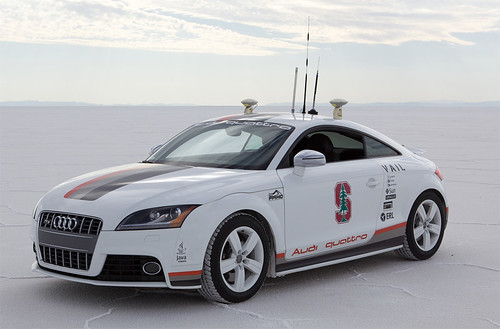Mobileye public offering by Intel
Mobileye S-1 Teardown – by Doug O’Laughlin – Intel looks desperate in this examination of the Mobileye S-1 filing.
Israeli origins
Mobileye is an Israeli based business acquired by Intel. It specialises in advanced driver assistance systems (ADAS) and autonomous driving. Its EyeQ series chips are used by pretty much every volume car manufacturer. I don’t know if the US sanctions on China for semiconductors will impact Mobileye negatively. The Mobileye EyeQ debuted in 2008 in the BMW 7 series alongside the model’s first hybrid power plant, the first turbocharged petrol engine for the model series and the first time that it had used four-wheel drive. Modern semi-autonomous functions may require several Mobileye EyeQ processors in the one car.
Acquisition by Intel for EyeQ tech
Mobileye went public in 2014 and was acquired by Intel in 2017. The same year Mobileye published a mathematical model for safe self-driving cars. In January, Intel announced plans to retake Mobileye public with a sale of a minority stake of the business.
There’s a number of good arguments for the Intel move:
- It allows engineers to be rewarded based on their work rather than on the overall group performance through Mobileye stock grants or stock options.
- It allows the company to spread the risk of autonomous driving as a future area that might not take off. While ADAS services are here and valued, there are technological, legal, regulatory and consumer hurdles for autonomous driving to overcome:
- AAA Survey Reaffirms Public Skepticism Over Self-Driving Tech – IoT World Today – this reruns a survey that the AAA first ran in 2020
- Pew Research found that women were skeptical of both ADAS and autonomous driving features
- Self-driving cars: Motorists will not be liable for crashes and can watch TV behind the wheel, government says | Sky News – Insurance companies rather than individuals will be liable for claims if vehicles are involved in accidents, which would pose problems for car companies with insurance companies
- There is the skepticism of knowledgable technologists over the future direction of autonomous road going vehicles: Godfather of Self-Driving Cars Says the Tech Is Going Nowhere | Futurism.
Mobileye public offering represents trouble at Intel
However, the Mobileye public offering makes a lot less sense given the decline of the stock market since the start of 2022. It implies that Intel is desperate for a capital infusion, presumably to fund the rebuild of Intel’s technological prowess under Pat Gelsinger.
More content related to issues like self driving cars can be found here.
China
U.S. charges 7 in alleged plot to repatriate U.S. resident to China | Reuters
China’s GDP Delay Shows Politics Trumps All for Communist Party – Bloomberg
Islamic State Rhetoric Targets China | Foreign Policy – The linking of Chinese imperialism to historical Western colonialism in Central and South Asia to some extent echoes contemporary Indian discourse on the contentious China-Pakistan Economic Corridor. Rising Chinese economic expansion via the BRI is especially perceived as a threat to the West’s global dominance, which has also been challenged by Russia’s invasion of Ukraine and the potential U.S.-China conflict over Taiwan. Amid the chaos in a transition from a unipolar to a bipolar world order, the Islamic State-Khorasan sees an opportunity to establish the Islamic State’s global caliphate. – I can’t see China getting cooperation from western countries or even India on this. Pakistan has proven itself to be an inconsistent unreliable partner over the decades and Russia has its focus elsewhere. Consider in concert with: China Blocks Polish Delegation’s Flight to Korea – The Chosun Ilbo – There was no explanation from Beijing for the tantrum, but Poland is among the most vociferous Eastern European countries and NATO members seeking to increase armaments due to the Russian invasion of Ukraine, and China seems to be siding with Putin. – interesting that the paper thinks this is aimed at Poland. This looks like a nail in the coffin for BRI and European market access for China
Shang-Yi Chiang says he will never return to work in China | DigiTimes – Mr Chiang is a star in semiconductor development and formerly worked at TSMC and had been a vice chairman of Chinese manufacturer SMIC. He was a key signifier for Taiwanese engineers that the Chinese businesses were good to work for. His leaving SMIC and this assertion about China will hurt China’s efforts to catch up and surpass, you can’t overstate the impact of Mr Chiang’s coming out and saying this
Design
AI-generated series depicts banff as extraterrestrial park
Economics
The Financial Times is the only UK newspaper that could have this honest discussion on Brexit. Interesting that political parties still can’t engage with the issue from an economic point-of-view. The anger and unrest that could break out if parties did engage with it could be devastating.
Yahoo Finance Tech newsletter with Daniel Howley | The pandemic rubber band is hitting the tech industry. – The recent bad news in the tech industry could be a delayed blow from the pandemic. Interest rate hikes, inflation hovering at 40-year highs, and sinking demand are hitting tech companies that have benefited from two years of pandemic-driven growth that saw valuations for some companies eclipse the $2 trillion mark. “As we entered the pandemic, everybody was afraid that there were going to be these disastrous layoffs and it was going to be horrible. And there were, very briefly, in a few places…but that immediately turned around,” TECHnalysis president and chief analyst Bob O’Donnell told Yahoo Finance. “In a weird way, it almost feels like now we’re getting some of the impact of the pandemic after the fact,” he added. “I think people are recognizing they maybe overextended their hiring when they expected some of the growth that happened during the pandemic to continue in the tech industry.
Morgan Stanley’s Mike Wilson: Stocks to avoid amid inventory problem – many retailers and firms suffering from a supply glut due to the whiplash effect on supply chains during COVID-19
Ethics
Nike just did it – by Judd Legum – Popular Information – we’ll see how the rubber meets the road on brand purpose if this story gets mainstream media traction…
Germany
The Omnipotence of China’s Xi Jinping: “Chairman of Everything” – DER SPIEGEL – his influence extends all the way to Germany. For companies like Volkswagen or Mercedes, China is the key sales market. In early November, Olaf Scholz will be traveling to Beijing for the first time as German chancellor, and despite the ongoing debate about the German economy’s unsustainable dependence on China, he will likely bring along a significant delegation of German executives – what’s interesting is the vulnerability and fragility that Der Spiegel notes in their own country’s political and business elites. Add to this idea, the current debate over Hamburg: EU warned Germany against approving Chinese investment in port – Handelsblatt | Reuters – The European Commission warned the German government last spring not to approve an investment by China’s Cosco into Hamburg’s port, German daily Handelsblatt reported on Friday, citing sources. Shipping giant Cosco last year made a bid to take a 35% stake in one of three terminals in Germany’s largest port in the northern city of Hamburg. Germany’s ruling coalition is divided over whether to approve the investment, government sources say, even as Beijing urges Berlin not to politicize the bid and the port authority warns this could hurt the economy
Health
Mental Health in Ads – ASA | CAP
Hong Kong
Hong Kong leader on new property measures, attracting foreign talent | CNBC – my take on this was a desire to get more mainlanders and maybe from the global south. That salary level of $318,000 implies tech entrepreneurs or mid-career finance bros
Screening of Batman film scrapped after Hong Kong censors say it is ‘not appropriate’ for outdoor showing – Hong Kong Free Press HKFP – The Dark Knight banned under Hong Kong’s Film Censorship Ordinance, organisers of movies screenings are required to submit works to the Office for Film, Newspaper and Article Administration (OFNAA) for film classification and clearance. Films must meet criteria relating to depictions of violence, cruelty and offensive language or behaviour. Since the passing of the national security law, censorship has been tightened to require authorities to evaluate whether the exhibition of a film would be “contrary to the interests of national security.” – presumably interests of national security includes a plot where Batman comes to Hong Kong to pursue an enemy, a corrupt Chinese businessman who laundered money for a mafia group. Just waiting for commercial disputes to be ruled ‘contrary to the interests of national security’ and the banking sector get screwed over
Hong Kong court allows media tycoon Jimmy Lai to hire UK lawyer for national security trial – Hong Kong Free Press HKFP – The judge ruled on Wednesday that issues which would arise during the trial, such as how the national security law and the sedition law should be understood in relation to freedom of expression, were “of great general public importance.” – what’s of more interest is the reasons why the Hong Kong government opposed his appointment. A lack of alternative counsel wasn’t seen as a reason to bring in the British lawyer. They described the case as lacking complexity as an additional reason – however it will be interesting to see if they view it as being sufficiently complex to move to the mainland when Owen becomes involved… and National security: Hong Kong court allows police to search journalistic materials stored on Jimmy Lai’s phones – Hong Kong Free Press HKFP – “Although always subject to the protection and procedural safeguards based on public interest and vigilant judicial scrutiny, journalistic material is not immune from search and seizure in the investigation of any criminal offence,” the judgement read. “As a matter of principle, the same must be true for offences endangering national security.” Excluding journalistic materials from the definition of “specified evidence” would also reduce the effectiveness of police investigation and prevent the national security law from serving its legislative purpose, which was to “effectively” stop, prevent, and punish offences endangering national security, the judges wrote.
Ideas
Kevin Kelly and techno-optimism
Kevin Kelly: The Case for Optimism
Innovation
Great video from Asianometry on the history of field programmable gate array.
Japan
Toyota Starts Plant in Junta-Led Myanmar Over a Year After Coup – WSJ – Toyota began assembling one or two Hilux pickup trucks a day at its plant in Yangon last month, a spokeswoman for the Japanese auto maker said Wednesday. She said Toyota wanted to contribute to the industrial development of Myanmar and the livelihood of local employees and their families. The car maker’s decision to begin production in Myanmar highlights a divide among foreign companies over whether to withdraw from the country, whose elected government was ousted in February 2021. As of the beginning of this year, close to two dozen major foreign companies had decided to suspend business operations in Myanmar, including energy giants Chevron Corp. and TotalEnergies SE and Japanese beer maker Kirin Holdings Co., according to the World Bank. Toyota had previously been included on that list. Companies suspending operations have cited shareholder pressure and a worsening human-rights situation among other reasons. Some activists have pushed companies to pull out of Myanmar to isolate or bankrupt the military junta – sounds more like assembly of knock down kits, likely coming in from Thailand
Korea
Kakao co-CEO Whon Namkoong quits over South Korea app outage chaos | SCMP – while its being described as a fire, it might not be an accident. The Koreans are still investigating. What’s more shocking is that there was one chokepoint of failure in a single data centre which took out both Naver and KakaoDaum services
Marketing
Tough times and low confidence call for bold action | WPP – When economic indicators are tough and consumer confidence is low, remember that brands with strong value propositions are 100% more recommended and 91% more loved than the rest, says WPP’s Lindsay Pattison We are in uncharted waters – consumers and businesses alike. Inflation has spiked, interest rates are on the up, the impacts of war are unknowable, and the OECD’s Consumer Confidence Index
Interesting that brands addressing UK consumers engage in political schadenfreude – Brands React On Social As Liz Truss Resigns As UK Prime Minister | The Drum – this is going beyond purpose to revel in the moment
Maíra Rahme’s Workshop and Meeting Energizers template | Miroverse
McLaren to Use Digital Ad Screens on its F1 Cars
Materials
Read This: The Tech Helping EV Makers Clean up The Supply Chain
The stubborn persistence of paper in a digital world | Financial Times
Online
Into the Innerverse: Inside Bastille’s first virtual concert – Unreal Engine
Quality
High-Tech Cars Are Killing the Auto Repair Shop | WIRED – technology is negatively impacting the owner experience of car owners due to long repair times, if the parts can even be found
Retailing
This Year Next Year: 2022 E-Commerce & Retail Media Forecast – GroupM
Security
VMware bug with 9.8 severity rating exploited to install witch’s brew of malware
The Return of Industrial Warfare | Royal United Services Institute read in conjunction with: Chokepoints – Center for Security and Emerging Technology – China’s most acute “chokepoints” are technologies—particularly high-end electronic components and specialized steel alloys—dominated by one or a handful of companies based in the United States or other like-minded democracies. Rather than playing for the “national team,” Chinese companies—both private and state-owned—often prioritize their brands and bottom lines over marching in lockstep with Beijing’s industrial policies. Many PRC firms choose to buy vital high-end components from trusted foreign suppliers because they harbor doubts about the quality of goods provided by domestic vendors. Technological breakthroughs made by Chinese universities and research institutes frequently fail to find commercial applications, leaving the PRC market dominated by foreign products.
China’s Chip Firm Says It Will Be Able to Continue Tapping TSMC Despite US Ban – Bloomberg and US Eyes Expanding China Tech Ban to Quantum Computing and AI – Bloomberg
Australia investigates claims China tried to hire former military pilots | South China Morning Post – Australia’s Defence Minister Richard Marles said he had asked the defence department to investigate claims that former Australian military pilots had also been recruited to join a South African flight school that operated in China. “I would be deeply shocked and disturbed to hear that there were personnel who were being lured by a pay check from a foreign state above serving their own country,” Marles said in a statement. “I have asked the department to investigate these claims and come back to my office with clear advice on this matter.” and Britain and Australia plan steps to stop China hiring their pilots — Radio Free Asia
US Chip Sanctions and Covid Spawn China’s Secondhand Semiconductor Market – Bloomberg – wait until this starts killing people. The Japanese have a number of specialist companies who validate semiconductors and test them to make sure that they work as advertised
Software
AI-generated images open multiple cans of worms | Axios and AI-generated digital art spurs debate about news illustrations | Axios
Wireless
Anti-Xi Jinping Posters Are Spreading in China via AirDrop | Vice News






